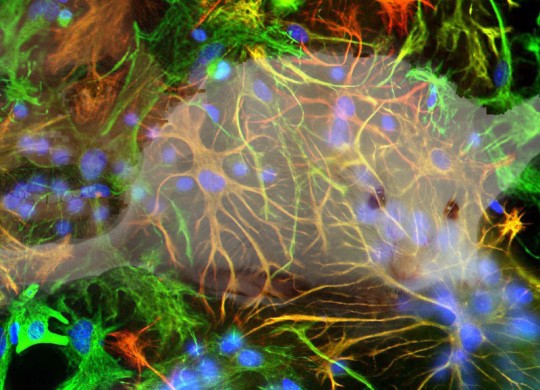Smarter!

While I’m fast losing brain function as I get “wiser”—what a paradox!—I’m glad to report that I’m smarter than a mouse. So there!
Scientists from the University of Rochester Medical Center, Rochester, NY, have declared it so in a paper published last year, and in a recent companion study, “A Competitive Advantage by Neonatally Engrafted Human Glial Progenitors Yields Mice Whose Brains Are Chimeric for Human Glia” (The Journal of Neuroscience).
Let me attempt a translation ….
These enterprising researchers took what has often thought to be the central nervous system’s “housekeeping” glial cells and implanted them (actually precursors of these cells) into baby mice. But it turns out that these Cinderellas are actually contributing to the cognitive functioning of the brain.
In humans these cells are larger, more diverse, and far more complex than glial cells in other species. And letting baby mice brains be taken over by the human cells had a measurable effect. Brain signals spread farther and quicker than what one would see in your average mouse. Data also showed that the hybrid brains of the über mice learnt faster and remembered longer.
“Whopping effects,” exulted U. of Rochester Medical Center neurologist Stephen Goldman. “We can say they were statistically and significantly smarter than control mice.” He added:
This does not provide the animals with additional capabilities that could in any way be ascribed or perceived as specifically human. Rather, the human cells are simply improving the efficiency of the mouse’s own neural networks. It’s still a mouse.”
But a smarter one, nonetheless.
All this to say, I am smarter than a mouse. And so are you. Some consolation for those of us rapidly declining and speeding downhill.
Humans. A special creation on Day 6. Unlike the creations of days before, which God saw that “it was good!” But of this special day the narrator reports:
And God saw all that He had made, and behold, it was very good!
Genesis 1:31
In fact, God is said to have spoken four times on this day (1:24, 26, 28, 29); the other days had only two divine utterances each. On no other day did God commence his creation with an announcement of his intention and purpose, in a first-person declaration:
“Let Us make man in Our image, according to Our likeness;
and let them rule ….”
Genesis 1:26–27
And, after creating man, God, for the first time, speaks to someone—he addresses man and woman with a blessing: the first time in Scripture that God’s communication occurs to one capable of receiving it.
“Be fruitful and multiply, and fill the earth, and subdue it
and rule over … every living thing that moves on the earth.”
Genesis 1:28
Something momentous happened on Day 6: the image of God had been placed upon one of God’s created beings with whom he could communicate!
The significance of the imago Dei in which man was made has been the source of much debate. That it refers to some physical resemblance between God and man is unlikely, seeing that God is spirit. So man does not possess the image of God; rather he is the image of God—a visible, bodily representative of invisible, bodiless deity.
Thus, while Genesis 1 powerfully establishes the transcendence of God without the created order, in the doctrine of the imago Dei we find the immanence of God within the world through his image, man. The role of mankind was to represent God to every other part of God’s creation, to make God tangible, if you will, to the world—God’s vice-regent!
Smarter than a mouse? You bet!
[Also check out my ongoing posts on Genesis, here.]












 Abe Kuruvilla is the Carl E. Bates Professor of Christian Preaching at The Southern Baptist Theological Seminary (Louisville, KY), and a dermatologist in private practice. His passion is to explore, explain, and exemplify preaching.
Abe Kuruvilla is the Carl E. Bates Professor of Christian Preaching at The Southern Baptist Theological Seminary (Louisville, KY), and a dermatologist in private practice. His passion is to explore, explain, and exemplify preaching.
4 Comments
Wow, what an amazing affirmation of our place in His creation. Thank you, Abe, for explaining it in plain English.
Thanks, Amin!
Abe,
Ever watch the kid’s cartoon about Yogi Bear of Jellystone Park (one of my old favorites . . . I mean really old!)? Well, the famous catch line is Yogi’s claim to be “smarter than the average bear.” Maybe he was beneficiary to mad science 60 years ago. Anyway, it’s a blessing to know that our identity and function is more than neuroscience!
John
John, I’ve no idea who you’re talking about. I wasn’t born then!
Just kidding!
Yup, our identity is not based on science.
Thanks, John!